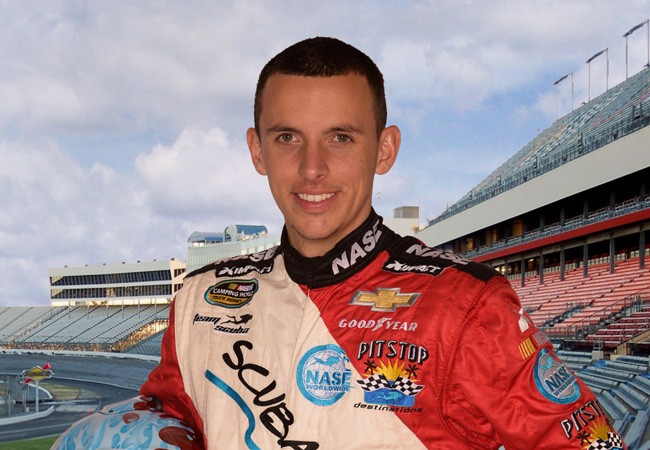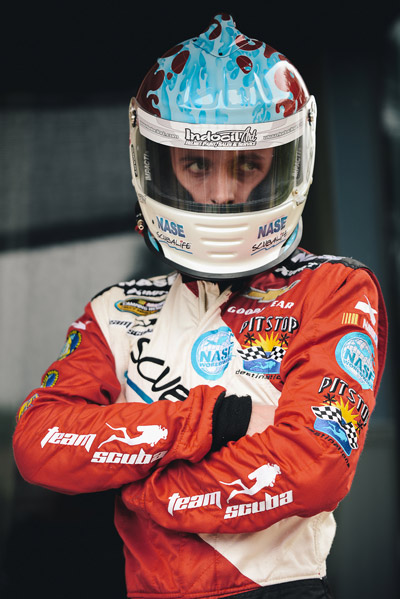
It was 2001 and Ray Black Jr. was nine years old in Alabama, watching the Daytona 500 on TV. The voice of broadcaster Darrell Waltrip, a three-time former champion, was over-flowing with emotion. His younger brother, Michael, who had gone 462 Cup races without a win, was keeping a narrow lead over the rest of the pack, in NASCAR’s most prestigious race. The drivers were in their final turn.
But then something catastrophic happened. One of the sport’s most celebrated drivers, Dale Earnhardt, was spun nose first into the wall and into the direct path of another driver. The two collided. It happened so fast, at such a pivotal moment, that the race continued its brief moments to the finish before spectators realized the magnitude of the crash.
Earnhardt was killed instantly. Michael Waltrip won the race and, with tears of joy running down his face, took his victory lap. Dale Earnhardt Jr. came in second.
“I was watching that race and something clicked in my mind. I don’t know what it was,” Black says. “It was a big moment in my life—huge,” the defining kind that separates everything into before and after. “As far as I can remember, my love for racing was probably that moment—that race,” he says. “Watching everything go down, it was the happiest day for somebody and then the worst day for somebody else. There was so much emotion going on and I thought, ‘Man, to be part of that would be amazing.’”
Tonight (Feb. 20), Black, now 23 and a resident of Flagler Beach, enters his first full season in NASCAR’s Camping World Truck Series, driving for Team Scuba. His father, Ray Black Sr., had expected him to go into their commercial diving business.
Most of the Black family lives in the small town of Greenville, not quite halfway between Montgomery and Mobile, Alabama. Many are employed in Black’s grandfather’s air-conditioning business. “No one’s really left the town,” Ray Jr. says. “It’s easy to get caught up in that life. I didn’t want that. So I decided to move here with my Dad and just take a chance.”
They moved to Jacksonville first, when Ray was 15, and to Flagler County about a year later. After being homeschooled, he finished his last six months of high school at Matanzas.
The tranquil ocean sounds in the world of diving are very different than the sonorous whirring of the tire treads on the track. But both were familiar to Black, and he had to choose between them.
When Ray Jr. told his father he wanted to race, it took some convincing, as Ray Sr., never really was a fan. “He likes racing because I do it, but other than that he doesn’t care for it,” Black says. His father hadn’t been in the room with his son at the moment of Earnhardt’s crash. “Good thing he wasn’t,” Black says.
When he did consent, it was under the condition that Black put everything he had into it—“right now.” His father took him to his first Mini-Cup when he was 13. Right away, Black knew he was good, even though he wrecked. He pulled into the pits where his father was waiting for him. “I thought he was going to be so mad, but he wasn’t mad,” Black says, because his son was giving it his all.
He fell in love with the nuanced strategies that often go unappreciated by the uninitiated—like when to use your pit stops in a 100-lap race. Then of course there’s the speed rush, but that has its drawbacks.
“I was a little crazy, I guess you could say,” Black says. “I wrecked a lot. I did a lot of dumb things, a lot of inexcusable things, in my racing.
“I’ll give you an example. We’d be doing really good and then, you know, say, someone passes me—I didn’t like that so I’d just go and take them out. Things like that. I just had no regard for anything. I didn’t care. I’m putting as much money into my race car as they are, so why shouldn’t I just be able to do what I want?”
This was the wrong mindset, he realizes now. All those wrecks were getting expensive. “Some of these guys just bust their butt all week to get ready for the weekend and they don’t have a lot of money. And I’m just lucky enough to have a good budget. And I’d just go in there and take someone out for no reason.”
All those wrecks did more than just get the other drivers mad. The sponsors had to foot the bill for the damages and they didn’t appreciate the negative attention. Then there was the fickle audience who may have viewed you as a “loveable madman” who wrecks someone or they may have viewed you as detestable. Black wasn’t a favorite. Then, of course, there was his own team to consider: they had to fix the cars. “No one’s happy when you start tearing things up,” Black says. (Drivers aren’t sociopaths, he adds. There are right ways and wrong ways to taking someone out on the track. “Technique” is everything.)
In the last Late Model Division race of the season at the New Smyrna Speedway, just before Black had turned 18, he was in a bad wreck. He got banged up, but it wasn’t so much the physical hurt that was the issue. “It took a hit on me. If I kept going down that road nothing good was going to come out of it,” he says. “I wasn’t getting any better at it. I wasn’t finishing really good. I wasn’t finishing races—I wasn’t earning respect.”

It came time to let the air clear. Black put his career in neutral. Ray Sr. used this time as an opportunity to be sagacious. “My Dad said, we’ll go to work for two years, and if you still want to do it, we’ll do it.” So Black gave diving a try.
After his two years of diving were up, he and his father had what Black described as “a manly conversation.” In those two years, Black achieved the goals he had set for himself. He’d become a scuba instructor. He’d become a commercial diving instructor. He’d started his own business. He’d made money.
“At that point, I learned a whole lot about diving. So I learned the patience of being able to check all your equipment, because that’s all your life-saving equipment,” and in doing so cultivated a deeper appreciation for life. He also learned the meaning of good business. Wrecking all the time was not good business.
The years flew by and it was time for a decision. “You kept your word,” Sr. said to him. “You had fun. Now do you want to continue what you’re doing or do you want to go racing?”
Ray Jr. didn’t have to think too long about the answer. Diving would always be there. He already lived on the beach. “But Racing is a once in a lifetime opportunity,” Black says. But if he was going to get back into the driver’s seat, he knew he needed to act “now.” Timing is everything. Sponsors favor building up the young guns so they can be groomed for the bigger teams, he says.
Now, after starting from scratch, he’s a potential winner of the Sunoco Rookie of the Year title in the Camping World Truck series. However, he has some stiff competition from perhaps five other drivers. Some are part of huge teams with lots of money behind them. “Not all teams are created equal,” Black says. “They’re probably going to build a new truck every race.” Needless to say, Black’s team, the appropriately named Team SCUBA, can’t do that.
“But we can definitely compete,” he says. Especially in Friday’s Daytona race, where it’s more of “a roll-of-the-dice kind of deal,” than some of the others, he says.
Black’s project manager for the Daytona race is Johnny Lulgjuraj, owner of Flagler Beach’s Oceanside Beach Bar and Grill, one of his favorite hangouts. Lulgjuraj is the type to know regular patrons by name or offer a customer a free menu item every now and again. But he’s also the type who has “very few, close, close friends,” he says.
But after talking a few times with Black, Lulgjuraj felt something toward the kid and it wasn’t just because he kept coming in for their cheeseburger. “He’s genuine. He’s hardworking. We became friends right away,” Lulgjuraj says, and he’s doing a lot to help Black build his brand.
Lulgjuraj is only 28, but he has background in talent management and has worked with some singers in the past. It’s more than a hobby. “Obviously, my time is pretty limited, running a restaurant, but it’s a passion project,” he says.
Before meeting Lulgjuraj, Black already had someone occupying that spot, loosely. But the guy was really just a friend who accompanied Black to the track—“someone who just makes sure I make it from point A to point B safely, and on time,” Black says. One day a race came up that this proxy manager couldn’t make.
So out of the blue, Black called Lulgjuraj. He said: “Man, I got an open spot. You interested in coming?’”
And just like that, Lulgjuraj found himself flying out to Texas Motor Speedway. “And I got a feel for it. I never knew much about NASCAR,” he says.
Similar to Black’s own experience watching that emotionally charged race as a child, “That first race got me hooked,” Lulgjuraj says. “I saw the behind-the-scenes. It’s amazing—the inner workings. A millimeter can make or break you in that sport. Obviously, I fell in love right away.”




























Palm coast nascar fan says
He did a great job in the race. Couldn’t believe he squeezed past both of those wrecks with only very minor damage. I will be rooting for him throughout the season in the truck series
m&m says
Finished forth.. Congrats and a good start to a career in nascar. Good luck in future races..